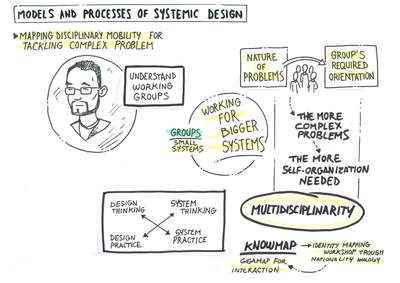Mapping disciplinary mobility for tackling complex problems
Marines Hernández, Luis Enrique (2018) Mapping disciplinary mobility for tackling complex problems. In: Proceedings of RSD7, Relating Systems Thinking and Design 7, 23-26 Oct 2018, Turin, Italy.
Preview |
Text
Marines_Mapping_2018.pdf Download (949kB) | Preview |
Preview |
Text
Marines_Slides_2018.pdf Download (7MB) | Preview |
![MarinesHernandez_MM_2018.jpg [thumbnail of MarinesHernandez_MM_2018.jpg]](https://openresearch.ocadu.ca/2748/3.hassmallThumbnailVersion/MarinesHernandez_MM_2018.jpg)  Preview |
Image
MarinesHernandez_MM_2018.jpg Download (316kB) | Preview |
Abstract
This paper aims to develop a conceptual and methodological framework to facilitate the understanding of cross-disciplinary interactions among heterogeneous working groups that work together with creative purposes to approach to complex problems. This approach requires a self-organization process among actants that regularly originates conflicts in terms of ideology, language, terminology, techniques and methods, —mostly because of epistemological contrasts among fields of knowledge—. These conflicts have direct impact in the coordination of agencies and the formulation or strategies (their variation, selection and adaptation), which enables or obstructs the interactions flow and its productive results.
To achieve the understanding of this phenomena, this paper is based on the following principles:
• Complex problems solving requires the formulation of systems-oriented approaches that need to be developed collaboratively, so the necessity of applying systemic and strategic design to facilitate cross-disciplinary processes is essential if we are looking to create innovative theoretical and methodological frameworks.
• Actants’ profiles are not determined by their disciplinary backgrounds, but by their capacity of flowing across institutionalized systems of knowledge, oriented by their interests of agency, and regulated by diverse exchange processes that enable their organization and linkage with other agents through the consumption, production, and application of information and knowledge. This is will be understood as “disciplinary mobility”.
• GIGA-mapping and other systemic design techniques are useful to represent complex processes that involve a multiplicity of agents, systems and interactions. Using systemic design and visualization as a tool for group-thinking facilitation can help to understand the disciplinary interaction stages and the diversity of actants’ attitudinal profiles that enable or hinder their workflow. (iv) There is a possibility of utilizing spatial metaphors to understand and communicate complex concepts like “disciplinary profiles” and “disciplinary mobility” that essentially represent the flexibility among multiple ways of understanding, being and acting while facing a problem. This paper uses the four dimensions of Neri Oxman’s Krebs Cycle of Creativity (Science, Engineering, Art and Design), to set-up a framework to map interactions across disciplinary territories.
Throughout the paper I will explain how these principles have been applied to create a methodological framework that brings theory and practice into a set of tools that can be implemented within a workshop format called “Knowmap”. The workshop is based on the following insights:
• Arnold van Gennep’s “rites of passage” model is useful to understand the disciplinary interaction process as a journey/experience where the individual experiments an identity transformation while moving from monodisciplinary understanding to a cross-disciplinary way of working. This approach identifies 3 different stages: separation, margin and aggregation.
• Exploring the relationships among the concepts of space, knowledge and power as understood by Michel Foucault, helps to reflect on the way academic disciplines have been historically and culturally constructed, in the same way that nations were created to regulate agents with the distribution and classification of space and identity. This happens as well with human knowledge and the way institutions create frontiers to separate and reproduce modes of knowledge production. This phenomenon has direct impact in the way human agents assimilate these modes as a way of being and doing.
• Finding patterns and creating personas can help our understanding of the different ways of acting while experiencing disciplinary interaction processes. With this purpose, the research illustrates 3 attitudinal profiles: “The local”, an expert on a single discipline; “The tourist”, and interdisciplinary curious with mixed expertise; and “The Knowmad”, a multidisciplinary strategist.
• Visual thinking and systemic design tools can facilitate the understanding of disciplinary interactions as complex experiences constituted by different layers of metaphorical spaces (territories of knowledge, actants’ mindsets, exchange processes, and systemic interactions), thought a rhetoric process to visualize strategic flows, interests, barriers and leverage points.
| Item Type: | Conference/Workshop Item (Paper) |
|---|---|
| Uncontrolled Keywords: | Complex problems, Cross-disciplinarity, Knowmadism, Strategic design, Collective mapping |
| Related URLs: | |
| Date Deposited: | 17 Jul 2019 16:35 |
| Last Modified: | 20 Dec 2021 16:08 |
| URI: | https://openresearch.ocadu.ca/id/eprint/2748 |
Actions (login required)
 |
Edit View |

 Lists
Lists Lists
Lists